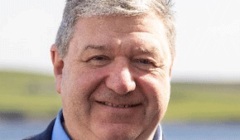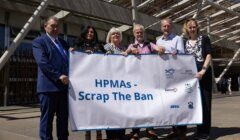Marine / Opposition parties fail to overturn HPMAs proposal
OPPOSITION parties have accused the Scottish Government of betraying coastal communities following two days of debate on the controversial proposal of designating highly protected marine areas (HPMAs) in Scotland’s waters.
On Wednesday, an attempt by the Scottish Conservatives, supported by Labour and the Lib Dems, to force the government to “think again” was voted down 62 to 53 with two abstentions.
A number of SNP parliamentarians representing coastal communities voiced their opposition to the concept of HPMAs and the way the government has gone about introducing the proposal.
Most notably were the contributions from Western Isles MSP Alasdair Allan (watch video clip below) and former rural affairs secretary and SNP stalwart Fergus Ewing, who angrily called on his own government to scrap the proposal by ripping up the HPMA plan in parliament.
Speaking after the vote, Highlands and Islands Conservative MSP Jamie Halco Johnson said: “Despite all the concerns about HPMAs raised by constituents and local stakeholders from right across the Highlands and Islands, the SNP’s payroll vote chose to abandon coastal communities and push ahead with these damaging proposals.
“They prioritised their dodgy deal with the Scottish Greens over the interests of their own constituents, highlighting the damaging chokehold the militant Greens have over the SNP and rural policy.
“The SNP must drop these proposals – which will do irreversible damage to our coastal communities, risking jobs and livelihoods – and start listening to the voices of local people.
But rural affairs and islands secretary Mairi Gougeon accused opposition parties of hypocrisy as all of their own manifestos included the introduction of HPMAs or similar measures to protect and enhance Scotland’s marine environment.
Meanwhile, for the first time in many years, a voting intention poll shows Labour ahead of the SNP in the regional list element of the Scottish voting system.
Become a member of Shetland News
The proposal to designate 10 per cent of Scotland’s waters as HPMAs by 2026 has created an uproar in coastal communities and has been described by some as “a modern Highland clearance”.
In HPMA fishing and aquaculture would be banned.
Orkney MSP Liam McArthur said the simple fact that this proposal had been thrown at rural communities had already a negative impact on the viability of the seafood sector.
In Shetland, the entire seafood sector united with the local authority in opposing the proposals which the Scottish Government had been consulting on.
Local MSP Beatrice Wishart said: “It’s no exaggeration to say that the proposals for Highly Protected Marine Areas, or HPMAs, have struck fear and anxiety in coastal and island communities.
“The communication from the Scottish Government about its proposals has been poor. Had it engaged meaningfully with communities before now it is possible that some concerns could have been alleviated.
“Addressing the climate emergency and protecting our vulnerable coastal and island communities is not in doubt but should be led by proportional and evidence-based policy, not imposed by a top-down approach.”
But speaking for the government, Gougeon said HPMAs would contribute to the preservation of Scotland’s natural capital and safeguard the marine environment for future generations.
“This government’s priority is the long-term sustainability of our communities, for our economic growth, supporting people to live and work in our rural areas and really helping those communities to thrive,” she said.
“But we are also wholly committed to protecting the marine resources our fishing industry depends on with consultation embedded at every stage and the just transition at the heart of everything we do, to give us the best chance at arriving the best decisions for the right reasons.
“HPMAs are in the process of being introduced by the UK Government through implementing pilot sites in England (…) and we are seeing that being done in a top-down way with unclear goals and in inappropriate locations.
“Unlike the Tories, this government is not willing to base the future of marine protection in Scotland on pilots in English waters.
“It is also not clear from the debate today whether the Tories support their own manifesto commitment on HMPAs. All the opposition parties campaigned and were elected on manifestos that committed to pursuing a policy of enhancing the protection of our marine environment.”
Meanwhile, while quoting from the Conservative’s election manifesto, Green MSP for the Highlands and Islands Ariane Burgess said she agreed with former Tory MSP Peter Chapman who said in 2020 that “having more no-take zones would be good not only for the environment but for our fishermen.”
“The Scottish Government is consulting with communities, trying to make this work for everyone with a stake in our seas,” she added.
“It’s the Tory politicians who are playing politics, jumping on an oppositional bandwagon, stirring up fear and uncertainty, and undermining our serious attempts to tackle the climate and nature crises which threaten all of our futures.”
Following the vote in parliament late yesterday afternoon, former Shetland MSP and now chief executive of trade body Salmon Scotland Tavish Scott urged the government to listen to the people living in coastal communities.
“Rarely has one policy united so many different sectors and communities across the Highlands and Islands in opposition,” he said.
“Ministers must do two things: keep the promise not to impose HPMAs on any community opposed to them; and bring forward revised proposals based on scientific evidence.”
Become a member of Shetland News
Shetland News is asking its many readers to consider paying for membership to get additional features and services: -
- Remove non-local ads;
- Bookmark posts to read later;
- Exclusive curated weekly newsletter;
- Hide membership messages;
- Comments open for discussion.
If you appreciate what we do and feel strongly about impartial local journalism, then please become a member of Shetland News by either making a single payment, or setting up a monthly, quarterly or yearly subscription.

















































































